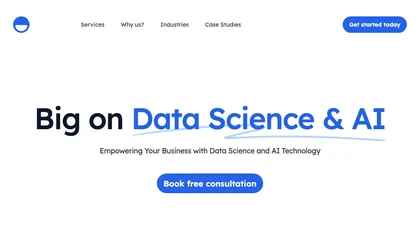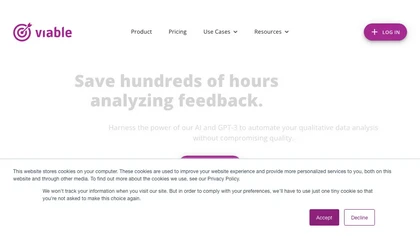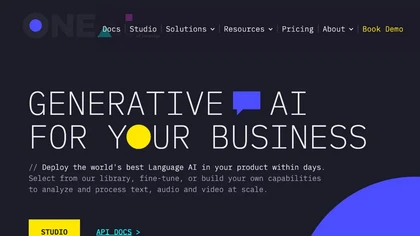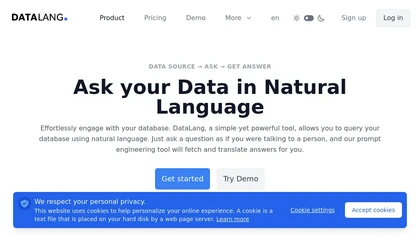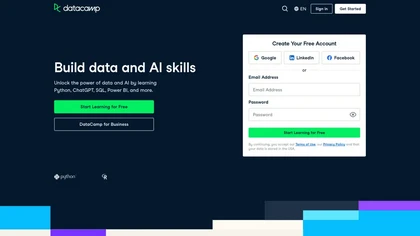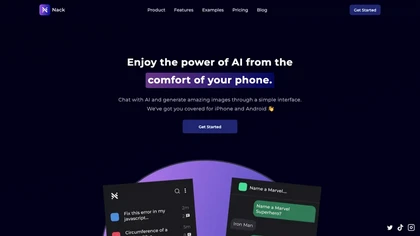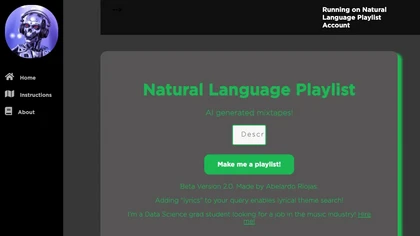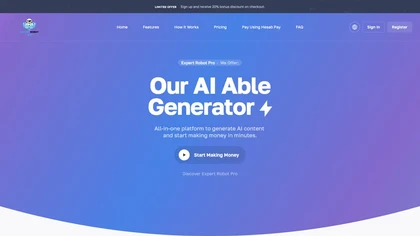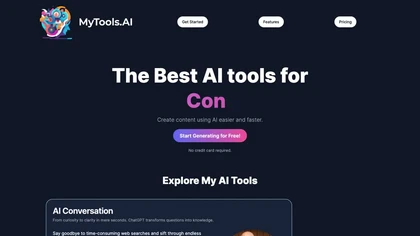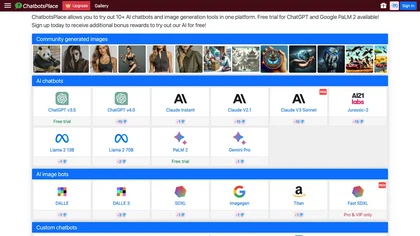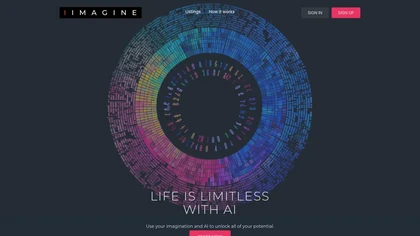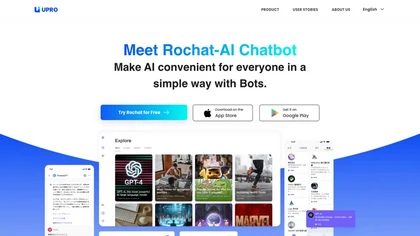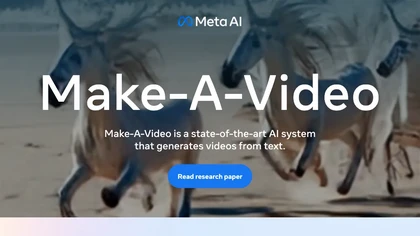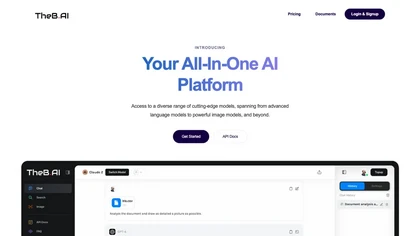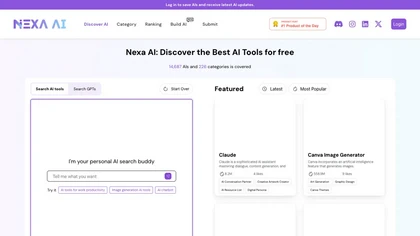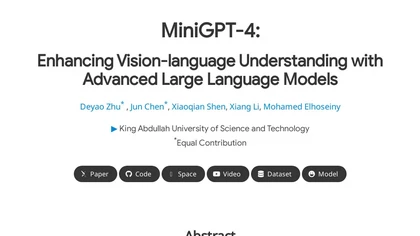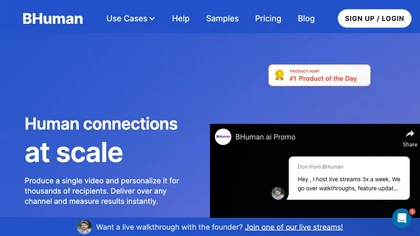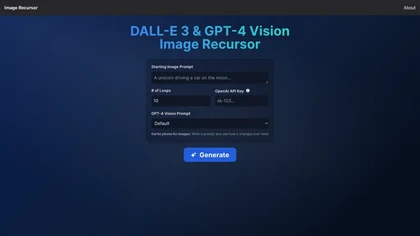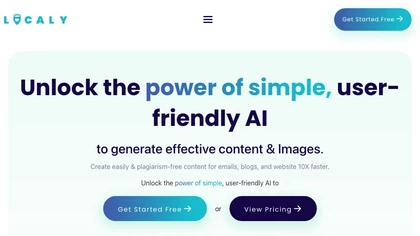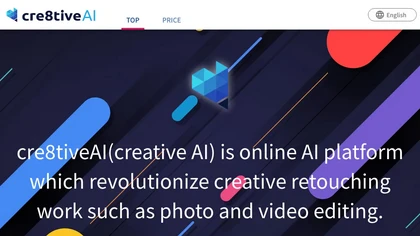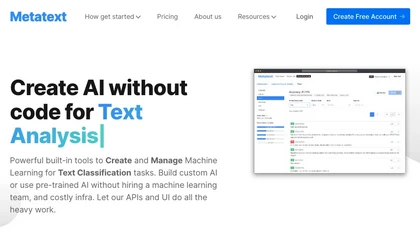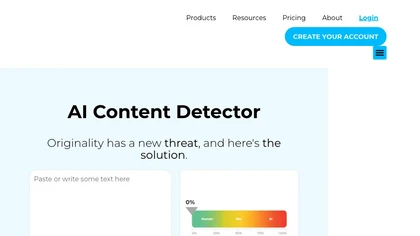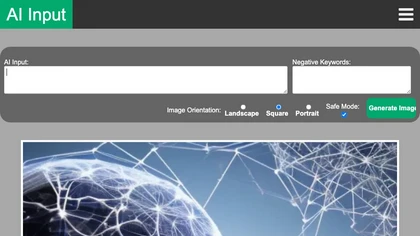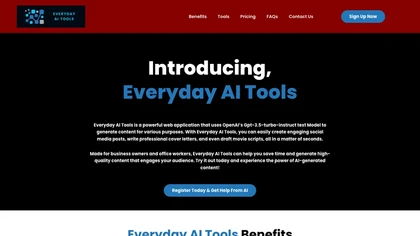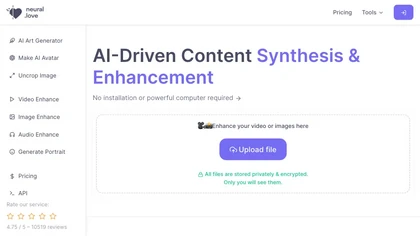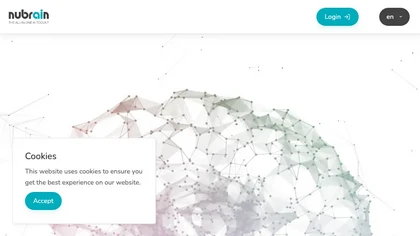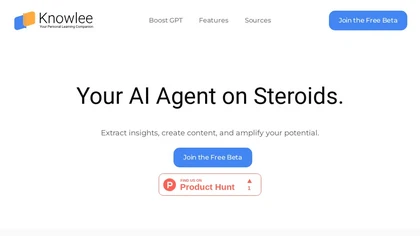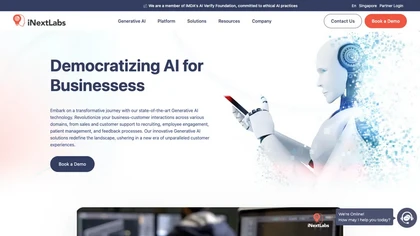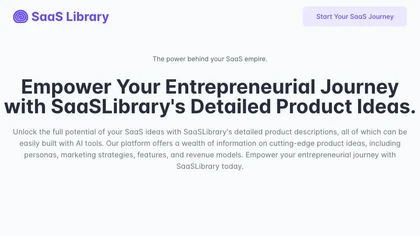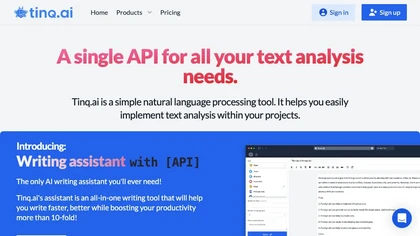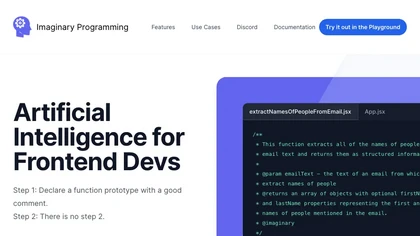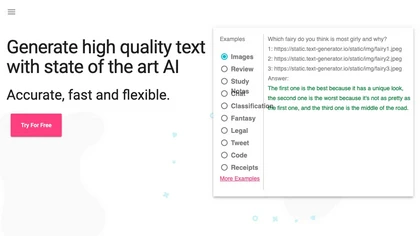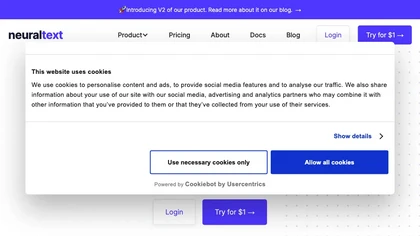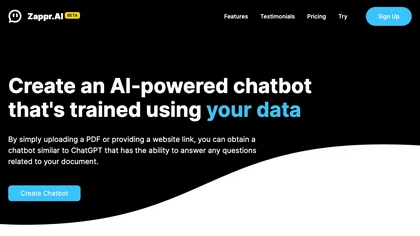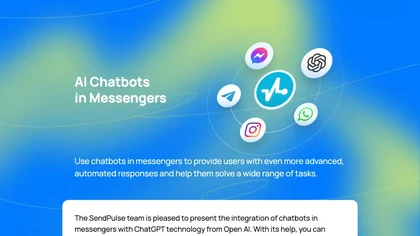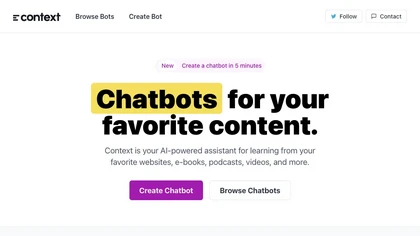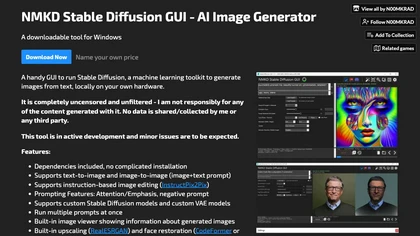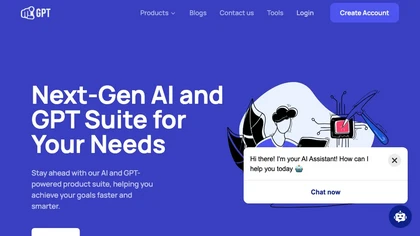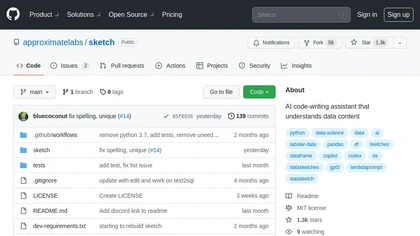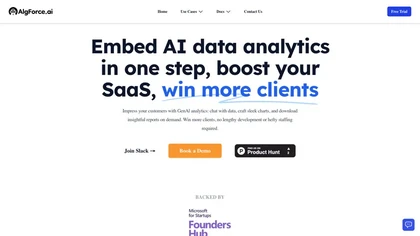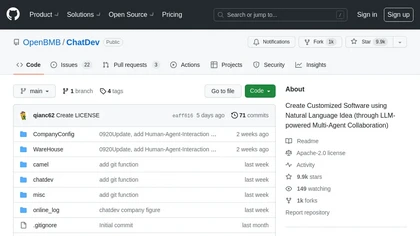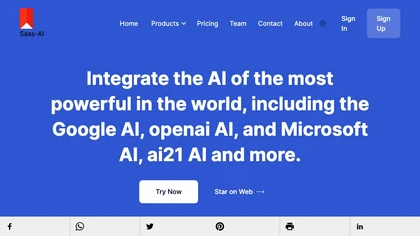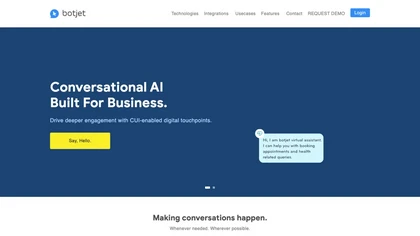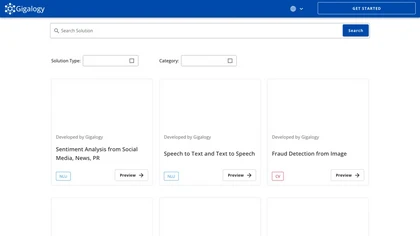AI use cases for Data Science
Generative AI can be applied in various applications for data science. Here are some examples to explore below for inspiration with AI tools to get you started with using AI in data science.
🛠️ 70 AI tools for Data Science
Explore a dynamic list of some of the most popular tools to get you started with various AI use cases and applications for Data Science to streamline your workflows and productivity today.
Think AI Agency features
- Natural language processing
- Computer vision
- Recommendation systems
- Predictive analytics
viable features
- Automated qualitative data analysis
- Customer feedback understanding
- Nlp technology
- Feedback analysis
One AI features
- Text processing
- Audio processing
- Video processing
- Language ai
- Generative ai
Neuralframes features
- Text-to-video generation
- Physicist-built
- Undergoing further development
- User feedback and suggestions
DataLang features
- Query databases using natural language
- Fetch and translate answers
- Handle a wide range of questions
- Provide insights on metrics
- Integrate with other tools
neuroflash features
- Text generation
- Image generation
- Natural language processing
- Machine learning
- Text summarization
- Image recognition
- Visual search
Personal AI features
- Scheduling
- Automating tasks
- Answering customer queries
🔥
Create your account, save tools & get personal recommendations
Receive a weekly digest of our handpicked top tools.
Unsubscribe anytime
Ipic.ai features
- Generate ai images
- Create original pictures
- Use deep learning techniques
- Consists of generator and discriminator components
- Used in various fields
- Unleash creativity
- Save time
- Cost-effective
- Offer customization options
- Provide tips for creating better ai images
DataCamp features
- Text generation based on prompts
- Interacting with AI-generated responses
- Writing assistance and idea exploration
- Enhancing applications with natural language processing capabilities
- Generating text based on predefined prompts
Nack AI features
- Generate images through a chat interface
- Search past chats
- Pin important conversations
- Text-to-image generation capabilities
- Access to a database of 2 billion images
SceneXplain features
- Description
- Multilingual support
- Api integration
- Content creation
- E-commerce
Natural Language Playlist features
- Generate playlists based on user queries related to song lyrics
- Recommend music based on specific genres and themes
- Allow users to describe and personalize their playlist using multiple sentences and adjectives
- Transform words into intelligible music recommendations
- Widen listeners' music horizons and enrich their relationships with music
BlogNLP features
- Content creation
- Seo optimization
- Keyword suggestion
- Natural language processing
- Writing style analysis
Expert robot pro features
- Chatbot assistant
- Text generator
- Image generator
- Code generator
- Voice chat services
My tools.ai features
- Instantly answer any question using a powerful AI model
- Helps in writing essays, LinkedIn bios, Facebook posts, etc.
- Transforms ideas into stunning visuals with DALL-E 3 model
- Supports 20+ languages for generating complex algorithms, API calls, etc.
- Streamlines coding process and meets project deadlines efficiently
ChatbotsPlace features
- Multiple AI chatbots support
- Image generation tools
- Community-generated image gallery
- Comprehensive suite of tools
- Platform news and updates integration
I IMAGINE features
- Specialized AI chatbots
- AI writing tool
- AI image generator
- Speech-to-text feature
- Custom chatbot creation
SnapGPT features
- Text recognition
- Image recognition
- Speech-to-text conversion
- Editable text conversion
- Voice recording conversion
Soffos AI features
- Nlp
- Pre-built apis
- Advanced nlp toolkit
- Extracting valuable insights from complex data sets
- Making informed, data-driven decisions
Brain Pod AI - image generator features
- Image generation
- Various purposes
- Marketing materials
- Social media posts
- Blog articles
Rochat-AI Chatbot features
- Generates images and text
- Automates tasks such as summarization and translation
- Designs AI bots with powerful capabilities
- Streamlines tasks
- Accessible on app stores for free
Make a Video features
- Generate videos from text
- Use image description and unlabelled video data to learn how the world looks and moves
- Allow users to add extra creative touches and variations to their videos based on input images
TheB.AI features
- Wide range of cutting-edge AI models
- API documentation and support for multiple models
- Customization of models for enhanced user experience
- Real-time search capabilities across various media types
- Personalization of models with personas and long-term memory
Nexa.ai features
- Comprehensive platform for discovering AI tools
- Wide range of AI tools spanning 226 categories
- GPT-3 integration for text generation, chatbots, and image creation
- Personal AI search assistant for exploring AI tools
- Curated list of AI tools for various purposes
Video Prompt AI features
- AI-powered storytelling
- AI-driven image compilations
- Speech-driven videos
- AI-generated videos
- AI-generated images
LamdAI Playground features
- Chatbud Chrome extension for smart video summaries and insights
- Web Talkbud platform for AI-driven conversations with uploaded videos
- Chatnur for interactive, AI-driven learning from YouTube videos
- API white label service for businesses to access sophisticated AI capabilities
- Focus on cutting-edge AI tools for digital interactions and conversation experiences
Adereso features
- Seamless communication across various channels
- Natural language processing capabilities
- Integration with CRM systems and e-commerce websites
- Streamlining operations
- Real-time performance metrics monitoring
Minigpt-4 features
- Image description generation
- Website creation based on hand-written drafts
- Story and poem generation inspired by images
- Problem solving based on images
- Cooking instruction teaching based on food photos
BHuman features
- Personalized video generation
- Customer connection
- Scaleability
- Realism
- Ai technology
Image Recursor features
- Utilizes DALL-E 3 and GPT-4 vision models
- Generates unique and customized image prompts
- Allows for real-time changes to prompts
- Provides a range of image enhancement options
- Offers a seamless and interactive experience
NOLU features
- Question answering
- Chat assistance
- Text data processing
- Neural network
- Machine learning
Localy features
- Ai chat
- Ai images
- Ai voiceover
- Ai code
- Ai speech-to-text
- Seo optimization
- Social media posts
- Humanize text
cre8tiveAI features
- Photo refiner
- Face refiner
- Sai
- Enpainter
- Png smallify
PoweredBy features
- Integration with ATS and HRIS providers
- API key generation for screening requests
- Utilizes proprietary model for job analysis
- Includes NLP and computer vision applications
- Proficiency in machine learning frameworks
Metatext features
- No-code platform
- Nlp products
- Annotate
- Curate
- Build
- Deploy
- Maintain
- Automate complex workflows
- Text annotation
- Training
- Iteratively curate
Crossplag features
- Detects human vs ai-generated text
- Uses machine learning algorithm and natural language processing techniques
- Provides fast, accurate analysis
- Easy to use with instant feedback
- Free to use and does not store analyzed data
AI Input features
- Generate free text images
- Advanced chat and gallery creation
- Adjust output based on negative keywords
- Image orientation adjustment
- Safe mode
Everyday AI Tools features
- Utilizes OpenAI's GPT-3.5-turbo-instruct text model
- Generates content for social media posts, cover letters, and movie scripts
- Tailored for business owners and office workers
- Advanced AI algorithms and natural language processing techniques
- Continuous learning and adaptation for superior results
AI Suggests features
- Content ideation
- Text generation
- Gpt-3 model support
- Over 20 templates
- Free usage
Neural Love features
- Image generation
- Enhancement
- Content synthesis
- Avatar creation
nubrain.ai features
- Content generation
- Time-saving
- Money-saving
- All-in-one solution
- Easy accessibility
Knowlee features
- Insights
- Content creation
- Productivity amplification
- Personalized solutions
- Organized assistance
GPT-4V features
- Image recognition
- Analysis of visual cues in images
- Content generation based on visual data
- Image upload for AI analysis
- Free trial for exploring capabilities
anse features
- Advanced natural language processing capabilities
- Customizable max tokens and message size
- Integration with Azure and Google APIs
- Support for multilingual interactions
- Efficient backend processing for smooth communication flow
Datagen features
- Image generation
- Video generation
- Facial recognition
- Human motion detection
- Api access
inextlabs.com features
- Generative AI platform
- Deploy AI chatbots across 40+ channels
- Personalize engagement with voice bots
- Low-code, no-code bot builder
- Advanced data exploration and actionable insights
SaaS Library features
- Product idea generation
- Market strategy development
- Revenue model analysis
- Persona insights
Mancoding features
- Generates digital artwork
- Uses stable diffusion model
- Produces high-quality realistic art
- Based on given text descriptions
- Easily transform words into images
Tinq.ai - NLP API features
- Ner
- Sentiment analysis
- Text classification
- Summarization
- Question answering
- Text generation
- Language detection
Imaginary Programming features
- Text generation
- Data classification
- Structured language parsing
- Unstructured language processing
Text-Generator features
- Text generation
- Content analysis
- Prediction of human reactions
- Research assistance
- Text classification and clustering
- Code generation
- Translation
- Tone and voice change in generated text
- Api endpoint
- Bulk generation capabilities
Neuraltext features
- Generate marketing copy
- Generate blog posts
- Write seo content quickly and easily
Zappr features
- Create chatbots
- Train chatbot with relevant documents
- Analyze documents to extract key information
- Deliver accurate answers to user questions in natural language
- Support a variety of file formats
AI Photo Robot features
- Train own image recognition model
- Automatic filtering of nsfw content
- Select from various ai models
- Set dimensions and subject strength
- Add additional subject styles and compositions
AI Studios features
- Text-to-speech
- Create ai video
ddmm
4.9ddmm features
- Search
- Access
- Database
- Images
- License-free
AI Chatbots in Messengers features
- Provide advanced and automated responses
- Simulate human conversation
- Integrate with various messaging platforms
- Use gpt-3 neural network model
Atlabs features
- AI script writer for generating scripts
- AI assets generator for creating and fetching video assets
- Motion graphics setup for designing on-brand graphics
- Magic overlays feature for easily supplementing videos with additional assets
- AI voiceover and captions in over 40 languages with auto-synced captions
Context features
- Learn from favorite website
- E-book
- Podcast
- Video
- Trending bots
- Newly released options
- Quick access
NMKD Stable Diffusion features
- Text-to-image
- Image-to-image
- Instruction-based image editing
- Prompt features
- Creating seamless images
Latent Labs features
- Reimagine images
- Generate visual designs
- Create logos and artwork
- Personalize results with detailed text descriptions
YourGPT features
- Customizable chatbots
- Knowledgebase experts
- Content masters
- Personal assistants
- Fine-tuning options for openai models
Sketch features
- Task1
- Task2
- Task3
- Task4
AlgForce Copilot features
- Natural Language Querying
- Domain Expert AI Language Models
- Data Visualization Collaboration Tools
- Whiteboard Solution for Team Collaboration
- Privacy Measures and Database Compatibility
AIPal features
- real-time chat with multiple AIs
- custom prompts
- image communication
- article summarization
- all-in-one assistance
ChatDev
4.1ChatDev features
- Multi-agent collaboration
- Customizable framework
- Version control
- Human-agent interaction
Saas-AI features
- Text processing
- Image processing
- Integration with top ai services
- Easy-to-use interface
- Affordable subscription plans
Botjet features
- Conversational Flow Designer
- Natural Language Understanding
- Debugging Console
- Pre-Built Knowledge Bundles
- 3rd Party Intent Engine Support
Neuralgen.ai features
- Automatic video translation services
- Text extraction
- Voice cloning
- High-quality music translation
- Realistic subtitles
Gigalogy Personalizer features
- Sentiment analysis
- Speech-to-text
- Text-to-speech
- Fraud detection
- Recommender systems
